
As you may gather brakes are very important on a bike. Not having good brakes will compromise your safety. So when buying an electric bike, it makes sense to pay attention to what type of brakes you want. Therefore, you may want to decide between hydraulic brakes, or mechanical brakes for your electric bike. You may also want to decide between either having disc or rim brakes. However, I discuss the differences between these 2 brake types in another article.
Here in this article, I talk about the differences between hydraulic and mechanical brakes. This is to help you decide which of these brake types you would prefer for your electric bike.
How Hydraulic Brakes Work
Hydraulic brakes work by containing fluid that’s pushed throughout the braking system to activate brake pads. The system has a reservoir that contains this fluid. When you press the brake lever, this fluid is pushed from the reservoir down to a caliper via a hose. This caliper has brake pads attached to it. So when the fluid reaches the caliper, it causes the brake pads to press against a rotor or a rim. This then causes the bike to slow down. By the way, whether the pads press against a rotor or a rim, will depend on if you have disc or rim brakes.

Hydraulic Brake Considerations
More Stopping Power
Hydraulic brakes give more stopping power than mechanical brakes. So when compared to mechanical brakes, hydraulic brakes cause you to stop over shorter distances. Therefore hydraulic brakes provide more safety.
Hydraulic brakes give more stopping power because the fluid within hydraulic braking systems does not compress. So this enhances the pressure the rider applies to the brake levers. As a result, the pressure that’s applied to the pads is greater than the pressure the rider is applying to the brake levers.
The extra stopping power you get from hydraulic brakes is especially beneficial on electric bikes. This is because electric bikes are heavier and can go up to faster speeds than regular bikes. So electric bikes usually need more braking power than regular bikes, to stop over the same distance. By the way, if you have hydraulic disc brakes on your electric bike, then you’re going all out.
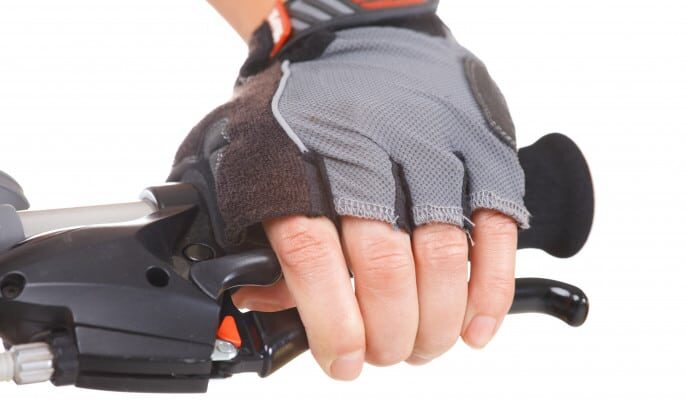
Self-Adjusting
With hydraulic brakes you don’t need to adjust the calipers to keep them in alignment. This is because as the pads wear down and become thinner, they fill up with fluid to compensate. So as the brake pads wear during use, they’re automatically adjusting. This maintains the pads distance from the rotor or rim. As a result, this retains the brake’s performance. So this is another reason why hydraulic brakes give very good stopping power.
Eventually your brakes will wear entirely and need replacing. However, hydraulic brakes should prevent you from having to adjust the calipers to keep the pads in alignment in the meantime.
Also, if you have hydraulic disc brakes, then you’re far less likely to get the loud squeaking noise you can sometimes get when the pads are out of alignment. Again, due to them being self-adjusting, keeping them in alignment.

Less Effort Needed When Braking
When compared to mechanical brakes, hydraulic brakes don’t need as much effort from the rider (when pressing the brake lever), to stop the bike over the same distance. This is due to the higher stopping force that hydraulic brakes provide. So with mechanical brakes you really need to give the brake levers more of a squeeze. This is to get the same stopping force as you’d get with less of a squeeze with hydraulic brakes.
So hydraulic brakes are particularly beneficial if you have weak hands. This could be if you have arthritis, or you’re of advancing years, or you’re recovering from injury, for example. These are all reasons why you may have an electric bike in the first place.
Less Maintenance than Mechanical Brakes
As mentioned further above, hydraulic brakes are self-adjusting. This contributes towards them needing maintenance less often than mechanical brakes. With hydraulic brakes the cables don’t stretch. Also the system doesn’t have mechanical parts that may sometimes need attention. Both factors you may have to contend with for mechanical brakes.

Maintenance Tends Not to be a DIY Job
Even though hydraulic brakes tend to need maintenance and adjustments less often than mechanical brakes, when they do need maintenance, it tends to be a harder job. So you’re more likely to need to take your electric bike to a bike shop, if your hydraulic brakes need anything done.
Because hydraulic brakes contain fluid within the system, you may need to bleed them sometimes. This is due to air sometimes getting into the system and fluid wearing over time. Both these factors reduce the brake’s effectiveness. Be aware though, that bleeding hydraulic brakes needs a couple of special tools. Also a lot of people will find this task tricky to do themselves.
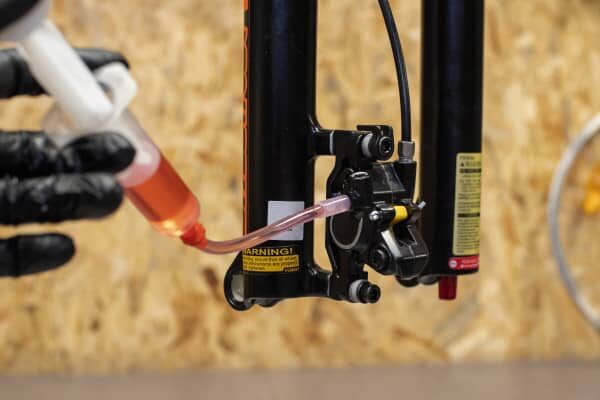 Bike mechanic bleeding hydraulic brakes
Bike mechanic bleeding hydraulic brakes
If you’re able to get your electric bike to the bike shop though, whenever your hydraulic brakes need bleeding (or any other maintenance), then this shouldn’t be a problem. Even so, remember that hydraulic brakes are mostly maintenance free. So they shouldn’t cause you to go to the bike shop often. If you do ever want to have a go at bleeding your hydraulic brakes, then this video shows you how.
shows you how.
Can Feel Spongy
This relates to the above, where I have talked about bleeding brakes. Hydraulic brakes can have a spongy/soft feel when you’re pressing the brake levers. This is due to air getting into the braking system preventing the fluid from flowing properly. So bleeding the brakes will resolve this issue. The good thing here though is that the spongy feel is an indicator that the brakes need bleeding. This will therefore help you maintain the brake’s performance.
Greater Consistency in Braking
Hydraulic brakes give a more consistent braking performance than mechanical brakes. This means that when comparing hydraulic brakes to mechanical brakes, you can generally expect the stopping power you’re getting from hydraulic brakes to be more relative to the amount of pressure you’re applying to the brake levers. This is because hydraulic brakes are a sealed system. So therefore dirt, water and mud can’t get into it, to reduce friction. This means that pressure is not lost throughout the system. So the brake pads grip the rotor or rim as soon as they’re demanded to.
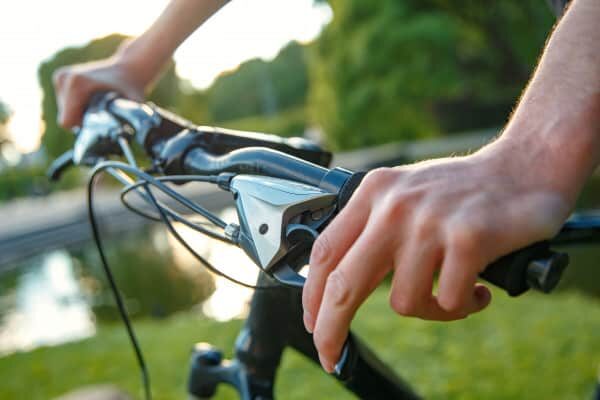
This consistency (and also responsiveness) that you get from hydraulic brakes makes them very suitable for technical off-road trails. When riding these sorts of trails, you’re likely to be often using the brakes with varying amounts of pressure. This is due to having to navigate your way through constantly changing terrain and inclines. So when riding in these conditions you want the assurance of having reliable brakes. Essentially brakes where you know what you’re going to get.
How Mechanical Brakes Work
These work by there being a cable running from the brake lever down to a caliper. Again, like with hydraulic brakes the caliper has brake pads attached. When you press the brake lever, this pulls on the cable. This then causes the pads attached to the caliper to press against a rotor or a rim. The bike will therefore slow down.
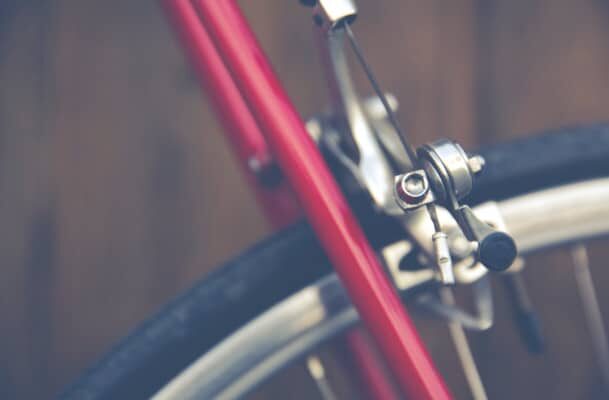
Mechanical Brake Considerations
Maintenance Needed More Often
Mechanical brakes need maintenance more often than hydraulic brakes. The brake pads/calipers need adjusting every now and then as the pads wear. If you ignore adjusting the mechanical brake calipers when needed, the braking performance will reduce. Again, as mentioned before, hydraulic brakes are self-adjusting.
As mechanical brakes have more moving parts, they are more likely to need tweaking and fixing than hydraulic bike parts. As a general rule, anything mechanical is likely to need maintenance every now and then. Especially as moving parts tend to wear.

Easier to Carry Out Maintenance
As mentioned above, you’re more likely to need to do maintenance more often with mechanical brakes, than hydraulic brakes. However, mechanical brake maintenance tends to be easier to carry out than hydraulic brake maintenance. So if your brakes were to start playing up during a ride, it’s more likely you’ll be able to stop the bike and fix this on the fly with mechanical brakes. For example, if you have too much gap between the rim/rotor and the pads (due to pad wear), you can usually just twist a couple of adjuster knobs. You’ll then be good to go again.
Conversely with hydraulic brakes, even though they are self-adjusting, if they start feeling spongy due to that they need bleeding, then this is something that’s tricky to do out on a ride. So this is something you’ll tend to need to do at home. It’s certainly not as simple as twisting a couple of knobs. Furthermore, bleeding hydraulic brakes can be a messy job, as you can spill fluids. So if you live in a small apartment without a garage, then mechanical brakes can be more convenient when it comes to maintenance.
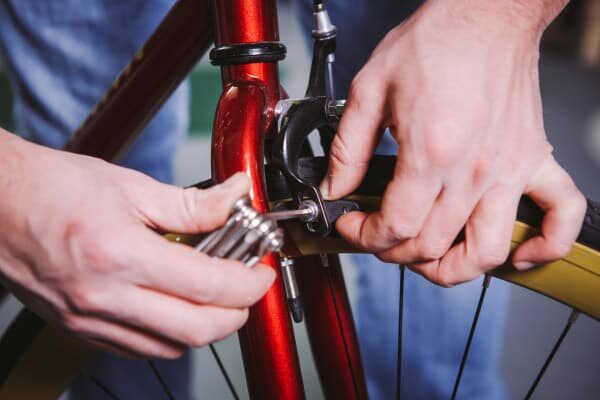
Peace of Mind During Rides
This relates to above, with regard to that mechanical brakes are easier to fix during rides, if anything goes wrong. This can give you more confidence when going on remote cycles. If something goes wrong with your mechanical brakes in the middle of nowhere, it can be less of a panic. If something goes wrong with hydraulic brakes in the middle of nowhere, you may not have the right fluid on you.
Your hydraulic brakes may suddenly need fixing in a remote location, during a cycling trip. In which case, local bike shops may not have the specialized parts that you may need. Whereas most bike shops will carry mechanical brake cables and housing. So mechanical brakes could give you more peace of mind than hydraulic brakes. This is due to the fact that you’re less likely to be in trouble, if you do need to try and fix the brakes trail side.
Easy to Replace Parts
It’s easier to replace parts for mechanical brake systems than hydraulic brake systems. With mechanical brakes, the cables are generally universal. Therefore, they are easy to replace if needed. Whereas with hydraulic brakes, you may need a certain type of fluid depending on the manufacturer. This makes it a bit trickier if you need to replace the fluid.
When it comes to replacing parts, you will generally find less compatibility issues with mechanical brakes compared to hydraulic brakes. You’ll find that different calipers tend to work well with different levers more often with mechanical brakes, than with hydraulic brakes.
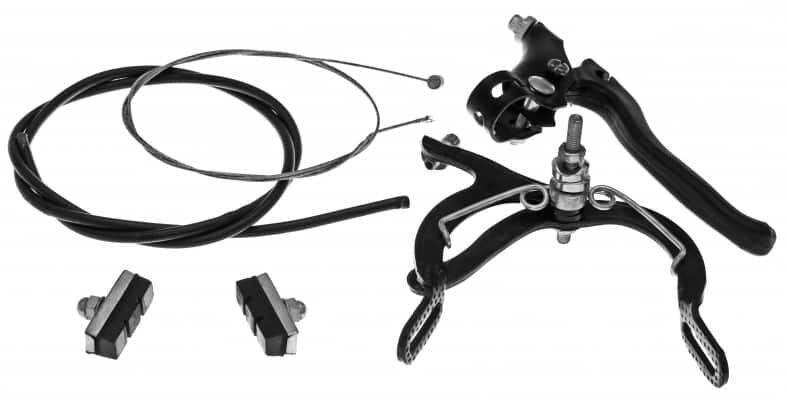
Still Have Good Stopping Power
Mechanical brakes still work effectively, even though hydraulic brakes have more stopping power. As long as mechanical brakes are good quality and are well maintained, they should work well enough. Certain considerations can help you get more braking performance out of mechanical brakes. These can include the below.
- Opting for disc brakes instead of rim brakes.
- Always making sure that the brakes are adjusted correctly.
- Replacing pads before they wear.
- Having large rotors if you have disc brakes.
- Opting for metal brake pads instead of resin brake pads (metal pads give more of a bite).
Can Get Jammed Up in the Mud
Mechanical brakes can get jammed up with mud and dirt. This will reduce braking performance. The moving parts of mechanical braking systems are outside, leaving them exposed to mud and dirt. This is not an issue with hydraulic brakes though, remembering that they’re a sealed system. So if you like doing a lot of off-road cycling, then hydraulic brakes are a good option. In which case, you may wish to opt for an electric mountain bike with hydraulic brakes.

Conclusion
When it comes to deciding between hydraulic brakes or mechanical brakes for your electric bike, neither is necessarily better than the other. It’s all down to what suits you best. If you’re a maximizer wanting the best stopping power you can get, then hydraulic brakes are the way to go. You may even like the fact that you’re likely to need to do maintenance less often with hydraulic brakes.
On the other hand, you may prefer simpler maintenance. For example, bleeding hydraulic brakes may seem too much hassle for you. In which case, you may prefer mechanical brakes. You may like the fact that mechanical brakes are easier to fix mid-ride and that the parts are easier to replace. These may all be factors that you may prioritize over all out maximum stopping force. After all, mechanical brakes can still work very well. Especially if they are perfectly adjusted and if you have disc brakes, as mentioned further above.
There’s also the cost as well. Hydraulic brakes cost more than mechanical brakes. So you may deem that mechanical brakes work well enough for you. In which case, you may not be able to justify the extra cost of hydraulic brakes. However, the more stopping power you have, the safer you are. So with this in mind, you may prefer hydraulic brakes in the name of caution. This is especially as I mentioned before that good stopping power is particularly important on electric bikes. Again, due to the extra weight (because of the motor and battery) they carry and the speeds they can go.
Ultimately, your choice of brake type for your electric bike is what you feel works best for you.
